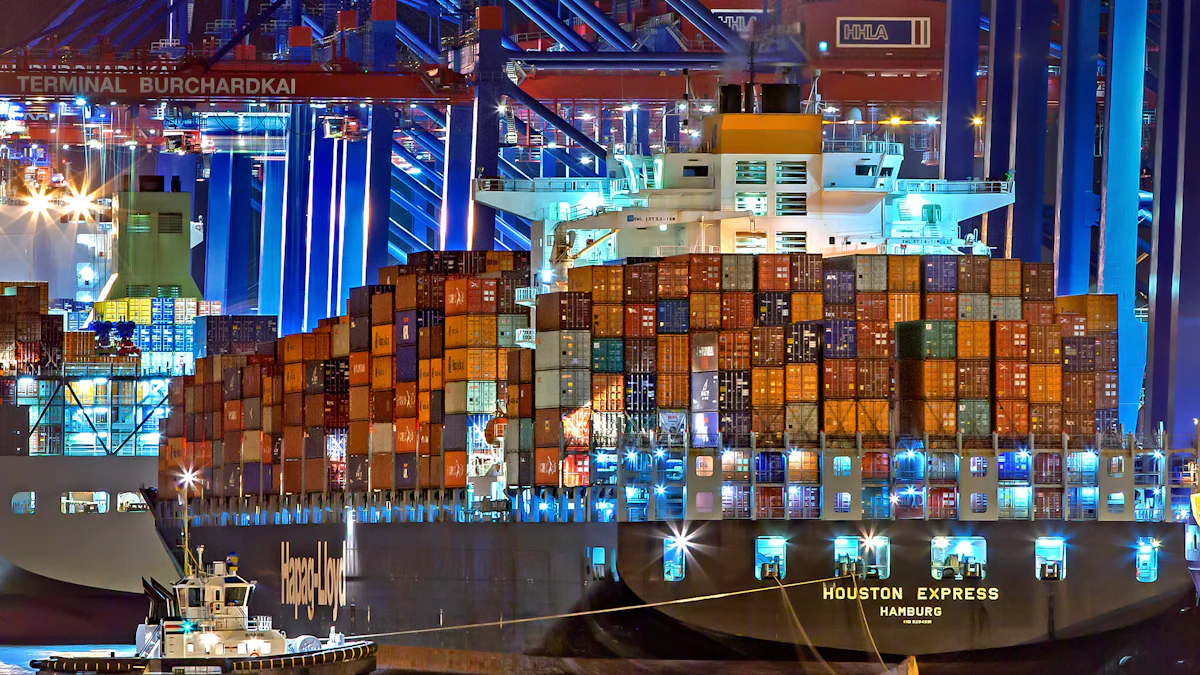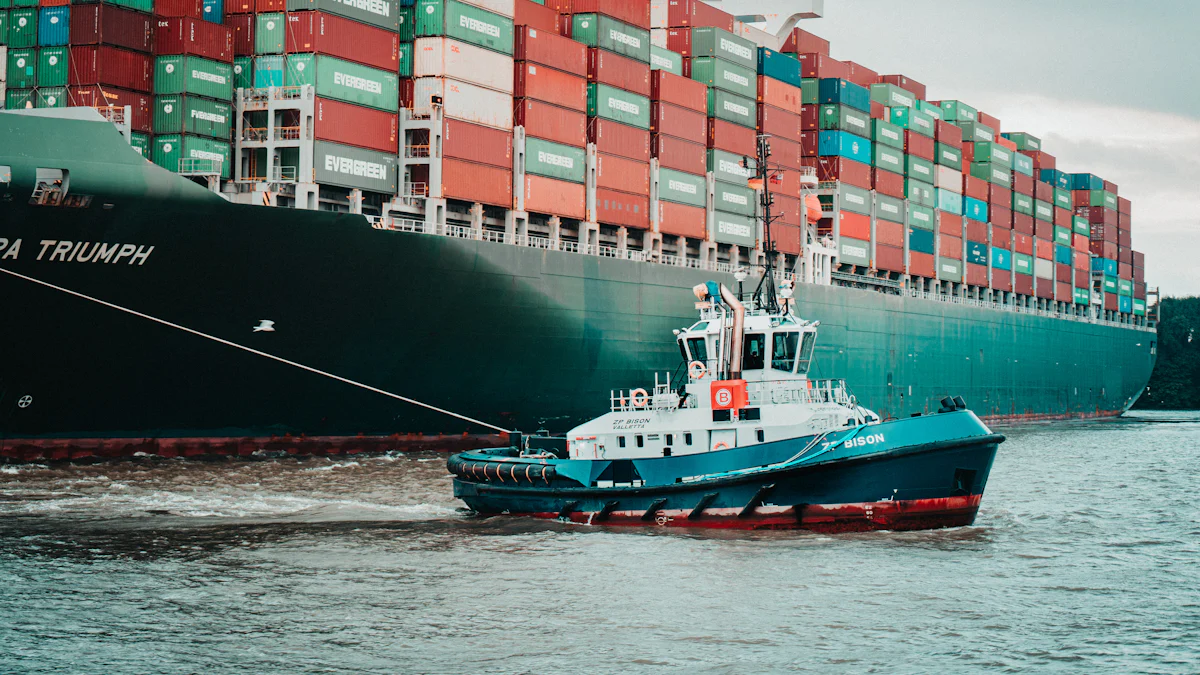A Comprehensive Guide to Global Trade Compliance

Global trade compliance holds immense importance in today's interconnected world. Trade and supply chain disruptions, geopolitical tensions, and the need for adherence to regulations have increased visibility on this issue. Compliance ensures that businesses follow domestic and international trade rules, regulations, and laws. Navigating the complexities of trade compliance involves understanding import and export controls, tariffs, and environmental policies. Effective compliance programs are essential for smooth international trade operations.
Understanding Global Trade Compliance
Definition and Scope
What is Global Trade Compliance?
Global trade compliance refers to the adherence to international laws, regulations, and standards governing the import and export of goods and services. This compliance ensures that businesses follow the legal requirements of all countries involved in trade transactions. Global trade compliance encompasses various aspects such as customs clearance, tariffs, environmental policies, and communication regulations. Companies must navigate these complexities to ensure smooth and lawful international trade operations.
Key Regulations and Standards
Several key regulations and standards govern global trade compliance. These include:
Customs Trade Partnership Against Terrorism (CTPAT): This program fosters a beneficial relationship between Customs and Border Protection (CBP) and importers.
International Traffic in Arms Regulations (ITAR): These regulations control the export and import of defense-related articles and services.
Export Administration Regulations (EAR): These regulations govern the export of dual-use items, which have both commercial and military applications.
Compliance with these regulations ensures that businesses avoid legal penalties and maintain their ability to operate internationally.
Importance of Compliance
Legal Implications
Non-compliance with global trade compliance can lead to severe legal consequences. Authorities may impose fines, sanctions, or even criminal charges on businesses that violate trade laws. For example, companies that fail to comply with ITAR or EAR regulations may face significant penalties. Legal implications underscore the importance of adhering to global trade compliance standards.
Financial Consequences
Failure to comply with global trade compliance can result in substantial financial losses. Businesses may incur fines, increased tariffs, or loss of market access. Non-compliance can also disrupt supply chains, leading to delays and increased costs. Companies must invest in robust compliance programs to mitigate these financial risks.
Reputational Risks
Non-compliance with global trade compliance can damage a company's reputation. Customers, partners, and stakeholders expect businesses to adhere to legal and ethical standards. Violations can lead to loss of trust and credibility. A tarnished reputation can have long-term negative effects on a company's success. Maintaining global trade compliance helps protect and enhance a company's reputation.
Key Components of Global Trade Compliance
Regulatory Frameworks
International Trade Laws
International trade laws form the backbone of global trade compliance. These laws govern the movement of goods and services across borders. The World Trade Organization (WTO) sets many of these rules. WTO agreements help ensure that trade flows smoothly and predictably. Companies must understand these laws to avoid legal issues.
Regional and National Regulations
Regional and national regulations add another layer of complexity. Different countries have unique rules for imports and exports. For example, the European Union (EU) has its own set of trade regulations. The United States follows different guidelines under the Export Administration Regulations (EAR) and International Traffic in Arms Regulations (ITAR). Companies must stay updated on these regulations to remain compliant.
Compliance Programs
Developing a Compliance Program
A robust compliance program is essential for any business engaged in international trade. Companies should start by conducting a risk assessment. This assessment identifies areas where the company may face compliance challenges. Based on this assessment, companies can develop policies and procedures to address these risks.
Training and Education
Training and education play a crucial role in maintaining compliance. Employees must understand the importance of following trade regulations. Regular training sessions help keep staff updated on the latest rules and best practices. Companies can use online courses, workshops, and seminars for this purpose.
Monitoring and Auditing
Monitoring and auditing ensure that compliance programs remain effective. Regular audits help identify any gaps in the compliance process. Companies can use internal teams or hire external auditors for this task. Continuous monitoring helps catch issues before they become significant problems. Effective auditing and monitoring contribute to a culture of compliance within the organization.
Risk Management in Global Trade

Identifying Risks
Common Risks in Global Trade
Global trade involves various risks that can disrupt operations. Political instability in a trading partner's country can lead to sudden changes in trade policies. Currency fluctuations can affect the cost of goods and services. Natural disasters can damage infrastructure and delay shipments. Companies must recognize these common risks to prepare adequately.
Risk Assessment Techniques
Effective risk management starts with thorough risk assessment. Companies should use quantitative methods to measure potential financial losses. Qualitative techniques help evaluate non-financial risks, such as reputational damage. Scenario analysis allows companies to explore different risk scenarios and their impacts. Regular risk assessments enable companies to stay proactive in managing global trade risks.
Mitigating Risks
Risk Mitigation Strategies
Companies must develop strategies to mitigate identified risks. Diversifying suppliers reduces dependency on a single source. Establishing strong relationships with multiple logistics providers ensures flexibility. Investing in insurance protects against financial losses due to unforeseen events. Implementing these strategies helps companies manage risks effectively.
Role of Internal Controls
Internal controls play a crucial role in risk mitigation. Companies should establish clear policies and procedures for trade operations. Regular audits ensure adherence to these policies. Training programs educate employees about compliance and risk management. Strong internal controls create a robust framework for managing global trade risks.
Leveraging Technology for Compliance

Technological Tools
Compliance Management Software
Compliance management software assists organizations in automating compliance tasks and monitoring regulatory changes. This software features a customizable regulatory compliance tracking system, automated workflows, and dashboards. Organizations can track compliance metrics with a single sign-on option. Key features include a user-friendly interface, customization options, and regulatory policy tracking. Dynamic workflows, document management, and reporting capabilities enhance the software's utility. Easy integration and cost-effectiveness make this software an essential tool for businesses.
Compliance management software helps organizations stay updated with new laws. This software ensures compliance across different departments. The software aligns goals with business priorities. A standardized system for resolving conflicts is established. Automation streamlines compliance processes. Data security improves significantly through the use of this software.
Automated Screening Tools
Automated screening tools play a crucial role in global trade compliance. These tools screen transactions against various regulatory lists. Automated screening tools identify potential compliance issues quickly. Businesses can avoid delays and penalties by using these tools. The tools integrate seamlessly with existing systems. Real-time updates ensure that screening remains accurate and effective.
Automated screening tools reduce the risk of human error. These tools enhance the efficiency of compliance processes. Businesses can focus on core activities while maintaining compliance. The use of automated screening tools supports a proactive approach to compliance.
Benefits of Technology
Increased Efficiency
Technology significantly increases the efficiency of compliance processes. Automated systems handle repetitive tasks quickly. This allows employees to focus on more strategic activities. Compliance management software and automated screening tools reduce the time spent on manual tasks. Real-time updates ensure that businesses remain compliant without constant manual intervention.
Efficiency gains translate into cost savings. Businesses can allocate resources more effectively. Streamlined processes lead to faster decision-making. Increased efficiency enhances overall business performance.
Enhanced Accuracy
Technology enhances the accuracy of compliance efforts. Automated systems minimize the risk of human error. Compliance management software ensures that all regulatory requirements are met. Real-time updates keep businesses informed of any changes in regulations. Automated screening tools provide accurate and timely identification of compliance issues.
Accurate compliance reduces the risk of legal penalties. Businesses maintain their reputation by adhering to regulations. Enhanced accuracy supports a culture of compliance within the organization. Technology plays a vital role in achieving and maintaining high compliance standards.
Continuous Learning and Adaptation
Staying Updated with Regulations
Monitoring Regulatory Changes
Monitoring regulatory changes is crucial for maintaining global trade compliance. International trade regulations and customs regulations constantly evolve. Companies must stay informed about new and emerging legislation. Regular updates on import and export rules are necessary. Businesses can access benefits through cargo security programs.
"The regulatory and enforcement climate of export and import controls changes rapidly and in some cases with little warning."
Companies should subscribe to industry newsletters and alerts. These resources provide timely information on regulatory changes. Attending webinars and conferences also helps. Experts often discuss the latest developments in trade compliance.
Engaging with Industry Groups
Engaging with industry groups offers valuable insights. These groups provide a platform for sharing best practices. Members can discuss challenges and solutions related to trade compliance. Industry groups often have access to exclusive information. This information helps businesses stay ahead of regulatory changes.
Joining trade associations is beneficial. Associations advocate for favorable trade policies. They also offer training and resources on compliance issues. Networking with peers in these groups enhances knowledge. Collaboration leads to better compliance strategies.
Adapting to Technological Advances
Embracing New Technologies
Embracing new technologies is essential for effective compliance. Artificial intelligence (AI) and machine learning can help. These technologies analyze vast amounts of data quickly. AI identifies patterns and trends in regulatory changes. This allows companies to adapt their compliance programs efficiently.
Automated systems streamline compliance processes. Compliance management software tracks regulatory updates. Automated screening tools check transactions against regulatory lists. These tools reduce the risk of human error. Businesses save time and resources by using technology.
Continuous Improvement
Continuous improvement is vital for maintaining compliance. Companies should regularly review their compliance programs. Audits help identify gaps and areas for enhancement. Implementing feedback from audits strengthens compliance efforts.
Training programs should evolve with technological advances. Employees need to understand new tools and systems. Regular training ensures staff remain knowledgeable. Investing in continuous improvement fosters a culture of compliance.
"Trade compliance teams face internal challenges as well. Oftentimes pressured to minimize any shipping impacts for interconnected global supply chains with expectations for faster shipping at the same time there is an increased burden of trade compliance and heightened due diligence which is also expected by governmental authorities."
In conclusion, staying updated with regulations and embracing technology are key. Continuous learning and adaptation ensure effective global trade compliance.
Global trade compliance remains vital for businesses engaged in international trade. Effective compliance programs ensure adherence to domestic and international regulations, minimizing legal and financial risks. Companies must prioritize continuous learning and adaptation to stay updated with evolving regulations.
"Due diligence is crucial for remaining viable in the global market."
The future of global trade compliance will likely involve greater use of technology. Automated systems and AI will enhance efficiency and accuracy. Companies that embrace these advancements will navigate the complexities of global trade more effectively.
See Also
Sustainable Transport Solutions for Efficient Supply Chains
Revealing Top Global Logistics Companies Guide
Ensuring Supply Chain Excellence with JUSDA
